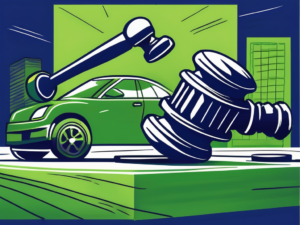Talk to Sales: (401) 200-6026

Owning a car dealership can be an exciting and rewarding venture for those with a passion for cars and a drive for success. However, starting and running a car dealership requires careful planning and consideration. In this step-by-step guide, we will walk you through the process of owning a car dealership, from understanding the industry to choosing the right location. Let’s dive in and explore the world of car dealerships together.
Understanding the Car Dealership Industry
Before embarking on your car dealership venture, it is crucial to have a solid understanding of the industry. By familiarizing yourself with the key players and staying up to date with the current trends and challenges, you will be better equipped to navigate the competitive landscape.
The car dealership industry is a dynamic and ever-evolving sector that plays a vital role in the automotive market. It serves as the intermediary between car manufacturers and consumers, providing a platform for buying and selling vehicles. To truly grasp the intricacies of this industry, let’s delve deeper into the key players, current trends, and challenges that shape its landscape.
Key Players in the Car Dealership Market
The car dealership market is comprised of various key players, each contributing to the overall ecosystem. These players include franchise dealers, independent dealers, and used car dealers. Each player has its own unique advantages and challenges that shape their business strategies and operations.
Franchise dealers are authorized retailers of specific car brands. They benefit from established brands and marketing support from the manufacturers. This affiliation allows them to tap into a loyal customer base and leverage the reputation and trust associated with the brand. However, franchise dealers also face the pressure of meeting sales targets and adhering to strict guidelines set by the manufacturers.
On the other hand, independent dealers operate without any brand affiliations. They have more flexibility in their inventory selection, allowing them to cater to a broader range of customer preferences. Independent dealers often focus on used cars, offering a diverse selection of vehicles at competitive prices. However, they must rely on their own marketing efforts and customer relationships to build trust and attract buyers.
Sell cars on the lot faster with AutoRaptor
Know if we’re the right fit within 10 minutes
Current Trends and Challenges
Like any industry, the car dealership market is influenced by trends and challenges that shape its trajectory. Staying informed about these factors is crucial for success in this competitive landscape.
One of the prominent trends in the car dealership industry is the rising demand for electric vehicles (EVs). As environmental concerns and government regulations push for greener transportation options, the popularity of EVs continues to soar. Car dealerships need to adapt to this trend by offering a variety of electric models and investing in charging infrastructure to meet the growing demand.
Another trend that has significantly impacted the industry is the surging popularity of SUVs (Sports Utility Vehicles). Consumers’ preferences have shifted towards larger and more versatile vehicles, leading to increased sales of SUVs. Car dealerships must ensure they have a diverse inventory that caters to this demand, offering a wide range of SUV models to attract potential buyers.
While there are exciting trends, the car dealership industry also faces its fair share of challenges. Increased competition is one such challenge. With numerous dealerships vying for customers’ attention, standing out from the crowd requires innovative marketing strategies, exceptional customer service, and unique value propositions.
Changing regulations also pose challenges to car dealerships. As governments implement new policies related to emissions, safety, and consumer protection, dealerships must stay updated and ensure compliance. Failure to do so can result in penalties, reputational damage, and loss of business opportunities.
Furthermore, economic fluctuations can significantly impact the car dealership industry. During economic downturns, consumers may delay purchasing new vehicles, leading to a decline in sales. Dealerships must be prepared to weather these economic storms by diversifying their revenue streams, offering competitive financing options, and providing exceptional customer experiences that drive loyalty.
In conclusion, understanding the car dealership industry requires a comprehensive knowledge of its key players, current trends, and challenges. By staying informed and adapting to the ever-changing landscape, you can position your dealership for success and effectively meet the needs of your customers.
Preparing for Your Car Dealership Venture
Once you have a good grasp of the car dealership industry, it’s time to prepare for your venture. This involves assessing your skills and experience, as well as developing a solid business plan.
Necessary Skills and Experience
To succeed in the car dealership business, it is important to have a combination of business acumen and automotive knowledge. Strong interpersonal skills and negotiation abilities are crucial when dealing with customers and suppliers. Familiarity with automotive financing and a passion for cars are also beneficial.
Developing a Business Plan
A well-crafted business plan is essential for securing financing and guiding your dealership’s growth. Your plan should outline your target market, competitive analysis, marketing strategies, and financial projections. This comprehensive document will serve as a roadmap for your business and impress potential investors or lenders.
Legal Considerations for Car Dealerships
Car dealerships operate within a regulated environment, and it is vital to familiarize yourself with the legal requirements specific to your location.
Licensing and Registration Requirements
Before opening your dealership, you will need to obtain the necessary licenses and registrations from your state’s Department of Motor Vehicles. These requirements may include a dealer license, a salesperson license, and a surety bond. It is important to comply with all regulations to avoid legal consequences.
Understanding Zoning Laws
Location is a critical factor for any car dealership. Familiarize yourself with the zoning laws in your area to ensure that your desired location is suitable for a dealership. Some areas may have specific zoning restrictions or limitations on dealership operations. Doing your due diligence regarding zoning laws will save you time and potential legal issues in the long run.
Sell cars on the lot faster with AutoRaptor
Know if we’re the right fit within 10 minutes
Financing Your Car Dealership
Financing is a crucial aspect of starting and running a car dealership. Understanding your financial needs and exploring various financing options will give you the necessary resources to turn your vision into a reality.
Initial Investment and Startup Costs
Starting a car dealership requires a significant initial investment. Your startup costs may include inventory, equipment, showroom renovations, marketing expenses, and personnel salaries. Carefully assess your financial situation and consider seeking advice from financial experts to determine the amount of capital needed to launch your dealership.
Exploring Financing Options
There are several financing options available to car dealership owners. Traditional lenders, such as banks and credit unions, offer loans specifically designed for dealerships. Additionally, you may explore manufacturer financing programs, partnerships with investors, or government-backed loan programs. Comparing the terms and interest rates of different financing options will help you make an informed decision.
Choosing the Right Location for Your Dealership
The location of your dealership can significantly impact its success. Careful consideration of various factors will ensure that you choose the right location to attract customers and maximize sales.
Factors to Consider When Selecting a Location
First and foremost, consider the local market demand for cars and the competition in the area. High traffic areas with easy access and good visibility often lead to increased footfall. Additionally, proximity to major highways, demographics, and population density are crucial factors to evaluate. Market research can provide valuable insights into local preferences and buying habits.
Importance of Market Research
Market research should be an integral part of your location selection process. Analyze the local market to understand customer preferences, price points, and the overall demand for vehicles. This information will help you tailor your inventory and marketing strategies to cater to the specific needs of your target customers.
With this step-by-step guide, you are well on your way to owning a successful car dealership. Remember, thorough research, proper planning, and dedication are key to building a profitable business in the ever-evolving automotive industry. Take your passion for cars and turn it into a thriving dealership that meets the needs and desires of your customers.
Want to improve your sales and move cars off the lot faster? Book a test drive with AutoRaptor to see how our simple dealership CRM software can help you close more deals effectively.
Subscribe to our Newsletter
Resources to help your dealership convert more leads into sales, retain more customers, and market inventory smarter, straight to your inbox every Sunday.




